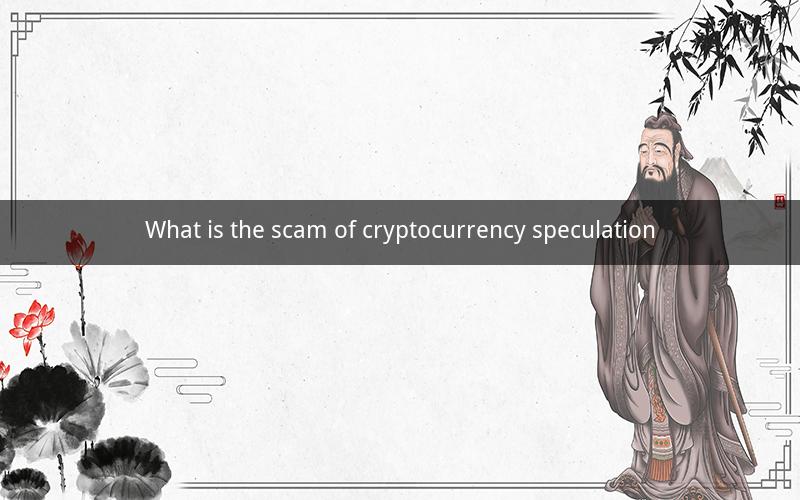
Table of Contents
1. Introduction to Cryptocurrency Scam
2. Types of Cryptocurrency Scams
2.1 Ponzi Schemes
2.2 Phishing Attacks
2.3 Fake Exchanges
2.4 Pump and Dump
2.5 ICO Scams
3. Common Characteristics of Cryptocurrency Scams
4. Protecting Yourself from Cryptocurrency Scams
4.1 Research and Verification
4.2 Be Skeptical of High Returns
4.3 Use Secure Wallets
4.4 Stay Informed
5. Conclusion
1. Introduction to Cryptocurrency Scam
The cryptocurrency market, though rapidly growing, has attracted various fraudulent activities. One such activity is cryptocurrency speculation scams. This article aims to shed light on what these scams are, their types, common characteristics, and ways to protect yourself from them.
2. Types of Cryptocurrency Scams
2.1 Ponzi Schemes
Ponzi schemes are pyramid schemes where investors are promised high returns in exchange for their investments. The scheme relies on recruiting new investors to sustain the illusion of profitability. Once the scheme collapses, investors lose their money.
2.2 Phishing Attacks
Phishing attacks involve sending fraudulent emails or messages that appear to be from legitimate sources. These messages often ask for personal information, such as passwords or credit card details, to steal sensitive data.
2.3 Fake Exchanges
Fake exchanges mimic genuine cryptocurrency exchanges to deceive investors. They typically ask for deposits but never allow withdrawals, leaving investors stranded with no access to their funds.
2.4 Pump and Dump
Pump and dump schemes involve artificially inflating the price of a cryptocurrency (pumping) to attract investors, followed by selling off the cryptocurrency (dumping) at a higher price, causing the price to plummet.
2.5 ICO Scams
Initial Coin Offerings (ICOs) are a popular way for startups to raise funds. However, some fraudulent companies use ICOs as a means to steal money from investors by promising unrealistic returns on their investments.
3. Common Characteristics of Cryptocurrency Scams
- Lack of Regulation: Cryptocurrency scams often operate without proper regulation, making it easier for fraudulent activities to take place.
- Guaranteed High Returns: Scammers promise high returns with no risk, which is usually too good to be true.
- Pressure to Invest Quickly: Scammers create a sense of urgency to pressure investors into making quick decisions without proper research.
- Unsolicited Contact: Scammers often reach out to potential victims through unsolicited emails or messages.
- Poor Website Design: Fake websites may have grammatical errors, lack contact information, or have a suspicious URL.
4. Protecting Yourself from Cryptocurrency Scams
4.1 Research and Verification
Before investing in any cryptocurrency, thoroughly research the project, team, and whitepaper. Verify the legitimacy of the exchange or platform through reviews and testimonials.
4.2 Be Skeptical of High Returns
Avoid investments that promise guaranteed high returns with no risk. Remember, if it sounds too good to be true, it probably is.
4.3 Use Secure Wallets
Store your cryptocurrency in secure wallets, such as hardware wallets or reputable software wallets. Avoid storing large amounts of cryptocurrency on exchanges.
4.4 Stay Informed
Stay updated with the latest news and trends in the cryptocurrency market. This will help you recognize potential scams and make informed decisions.
5. Conclusion
Cryptocurrency speculation scams are a significant threat to the growing cryptocurrency market. By understanding the types of scams, their common characteristics, and ways to protect yourself, you can avoid falling victim to these fraudulent activities.
Frequently Asked Questions
1. What is the difference between a Ponzi scheme and a pyramid scheme?
2. How can I identify a phishing attack?
3. Are all cryptocurrency exchanges fake?
4. What is the difference between a legitimate and a fraudulent ICO?
5. How can I protect my personal information from scammers?
6. Should I invest in a cryptocurrency that promises high returns with no risk?
7. What is a pump and dump scheme, and how can I avoid it?
8. How can I research a cryptocurrency project before investing?
9. What are the risks associated with using cryptocurrency exchanges?
10. How can I stay informed about the latest scams in the cryptocurrency market?